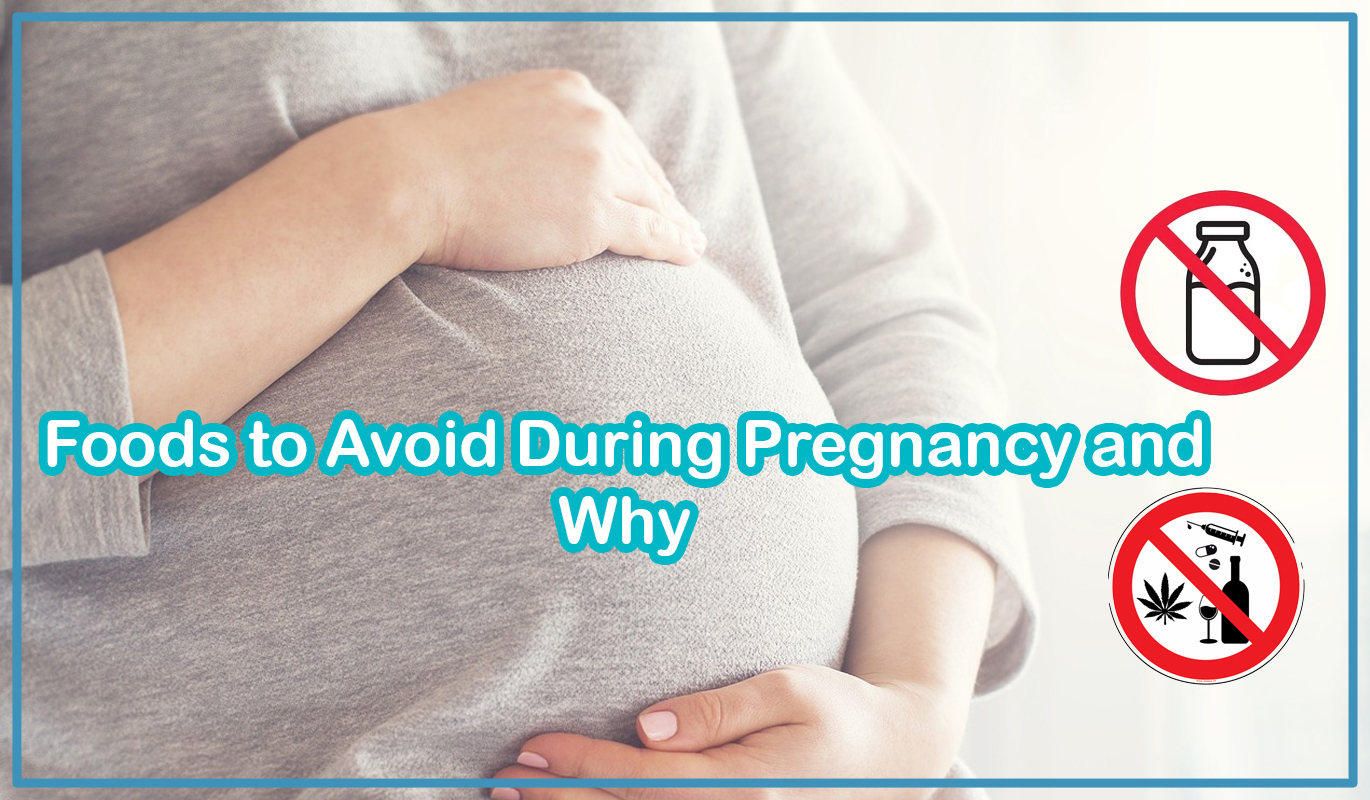
Pregnancy is a crucial time for both the mother and the developing baby. Nutrition plays a vital role in ensuring a healthy pregnancy, and it’s important to be mindful of what you eat. Certain foods can pose risks to the health of the mother and baby, and it’s essential to know which ones to avoid. This article will explore the foods to avoid during pregnancy and explain why they are harmful, helping expectant mothers make informed dietary choices.
Understanding the Importance of Diet During Pregnancy
A balanced diet is vital during pregnancy to provide essential nutrients for the growing baby and maintain the mother’s health. Nutrients such as folic acid, iron, calcium, and protein are particularly important. However, while focusing on these nutrients, it’s equally important to be aware of foods that can be harmful during pregnancy.
Foods to Avoid During Pregnancy
1. Raw or Undercooked Seafood
Why to Avoid: Raw or undercooked seafood, including sushi, oysters, clams, and mussels, can be contaminated with harmful bacteria and parasites, such as Salmonella, Listeria, and Vibrio.
Risks:
- Listeriosis: Caused by Listeria bacteria, it can lead to severe infections and complications such as miscarriage, premature delivery, and stillbirth.
- Parasitic Infections: Such as Toxoplasmosis, which can cause serious health issues for the baby, including blindness and intellectual disabilities.
2. Raw or Undercooked Meat and Poultry
Why Avoid: Similar to seafood, raw or undercooked meat and poultry can harbor harmful bacteria like E. coli, Salmonella, and Listeria.
Risks:
- Foodborne Illnesses: These bacteria can cause severe foodborne illnesses, which can be particularly dangerous during pregnancy.
- Toxoplasmosis: Undercooked meat can also be a source of Toxoplasma gondii, leading to toxoplasmosis, which can harm the baby.
3. Unpasteurized Dairy Products
Why to Avoid: Unpasteurized milk and dairy products can contain Listeria, Salmonella, and E. coli, which are harmful to pregnant women and their babies.
Risks:
- Listeriosis: The same risks apply here as with raw seafood, with potential for miscarriage, stillbirth, and severe neonatal infection.
- Severe Food Poisoning: Unpasteurized products can cause severe food poisoning, which can lead to dehydration and other complications.
4. Certain Types of Fish
Why to Avoid: Some fish contain high levels of mercury, which can be harmful to the developing baby’s brain and nervous system.
Types of Fish to Avoid:
- High-Mercury Fish: Shark, swordfish, king mackerel, and tilefish.
- Raw Fish: Such as sushi-grade fish that has not been properly frozen to kill parasites.
Risks:
- Mercury Poisoning: High levels of mercury can impair fetal brain development and lead to developmental delays and learning disabilities.
5. Raw or Undercooked Eggs
Why to Avoid: Raw or undercooked eggs can be contaminated with Salmonella.
Risks:
- Salmonellosis: Infection can cause fever, nausea, vomiting, stomach cramps, and diarrhea, which can be particularly severe for pregnant women.
6. Unwashed Fruits and Vegetables
Why to Avoid: Unwashed fruits and vegetables can be contaminated with harmful bacteria and parasites, including Toxoplasma.
Risks:
- Foodborne Illnesses: Such as E. coli and Salmonella.
- Toxoplasmosis: This can lead to serious health issues for the baby.
7. Caffeine
Why Limit: High levels of caffeine can cross the placenta and affect the baby’s heart rate and development.
Recommended Limit:
- Moderation: Limit caffeine intake to less than 200 milligrams per day (about one 12-ounce cup of coffee).
Risks:
- Miscarriage and Low Birth Weight: High caffeine intake has been linked to an increased risk of miscarriage and low birth weight.
8. Alcohol
Why to Avoid: There is no safe amount of alcohol during pregnancy. Alcohol can lead to Fetal Alcohol Spectrum Disorders (FASDs).
Risks:
- Fetal Alcohol Syndrome (FAS): Can cause severe developmental delays, intellectual disabilities, and physical abnormalities.
- Developmental Issues: Even moderate alcohol consumption can lead to developmental and behavioral problems.
9. Processed Foods
Why to Avoid: Processed foods often contain high levels of unhealthy fats, sugars, and additives.
Risks:
- Excessive Weight Gain: Can lead to gestational diabetes and other complications.
- Lack of Nutrients: Processed foods often lack essential nutrients needed during pregnancy.
Healthy Alternatives and Tips
1. Cook Seafood and Meat Thoroughly
Safe Practice: Ensure all seafood, meat, and poultry are cooked to safe internal temperatures to kill harmful bacteria and parasites.
2. Choose Pasteurized Products
Safe Practice: Opt for pasteurized milk, cheese, and other dairy products to avoid bacterial contamination.
3. Select Low-Mercury Fish
Safe Practice: Include low-mercury fish in your diet, such as salmon, sardines, and trout, which are rich in omega-3 fatty acids and beneficial for fetal development.
4. Cook Eggs Completely
Safe Practice: Cook eggs until both the yolk and white are firm. Avoid foods made with raw or partially cooked eggs, such as homemade mayonnaise or certain desserts.
5. Wash Fruits and Vegetables Thoroughly
Safe Practice: Wash all fruits and vegetables under running water before eating or cooking them. This reduces the risk of contamination with harmful bacteria and parasites.
6. Moderate Caffeine Intake
Safe Practice: Limit your caffeine consumption to below 200 milligrams per day. Opt for caffeine-free or low-caffeine alternatives, such as herbal teas.
7. Avoid Alcohol Completely
Safe Practice: Abstain from alcohol entirely during pregnancy. Choose non-alcoholic beverages and mocktails as safe alternatives.
8. Focus on Whole Foods
Safe Practice: Prioritize whole, unprocessed foods rich in essential nutrients. Incorporate a variety of fruits, vegetables, lean proteins, and whole grains into your diet.
Maintaining a healthy diet during pregnancy is crucial for the well-being of both the mother and the developing baby. By avoiding certain foods and making mindful dietary choices, expectant mothers can minimize the risks associated with harmful bacteria, parasites, and toxins. Remember to consult with a healthcare provider or nutritionist for personalized advice and to ensure a balanced and safe diet throughout pregnancy.
Implementing these dietary guidelines will not only support a healthy pregnancy but also contribute to the overall health and development of your baby. Prioritize safe, nutritious foods and stay informed about potential risks to navigate your pregnancy with confidence and peace of mind.